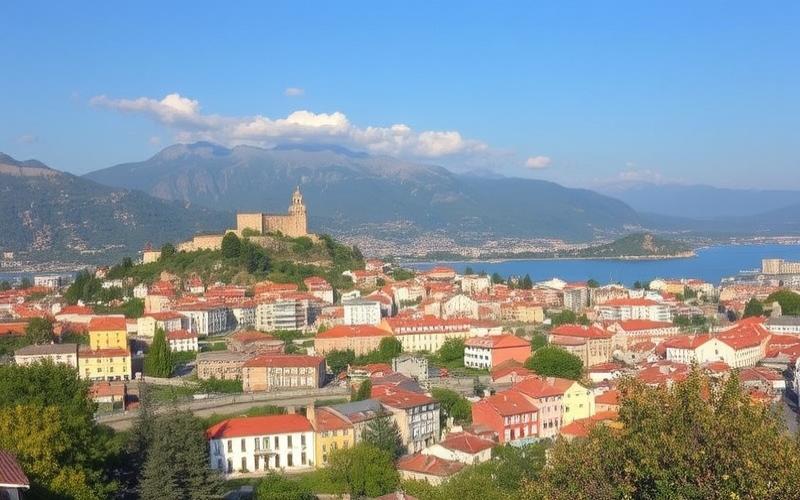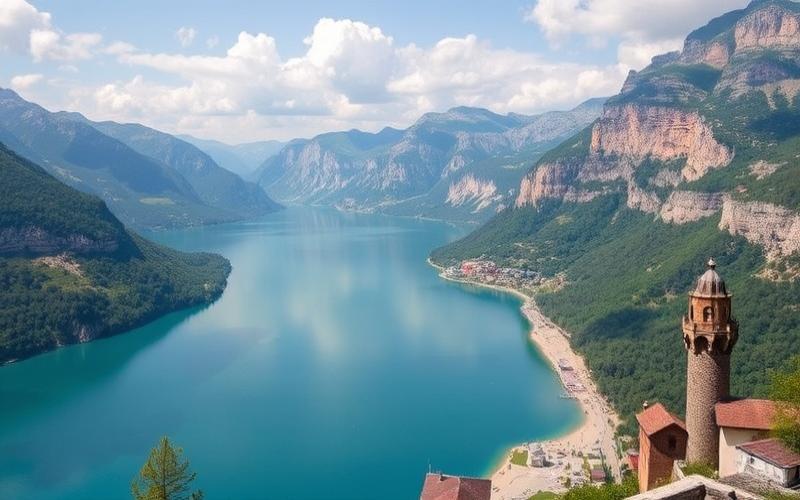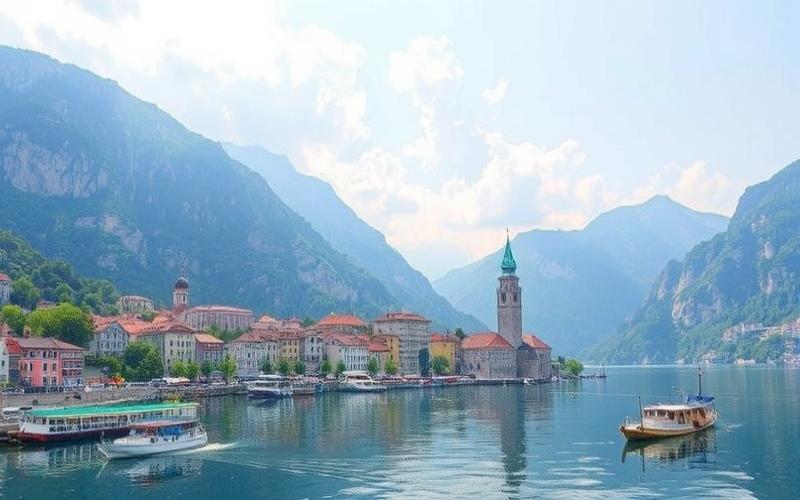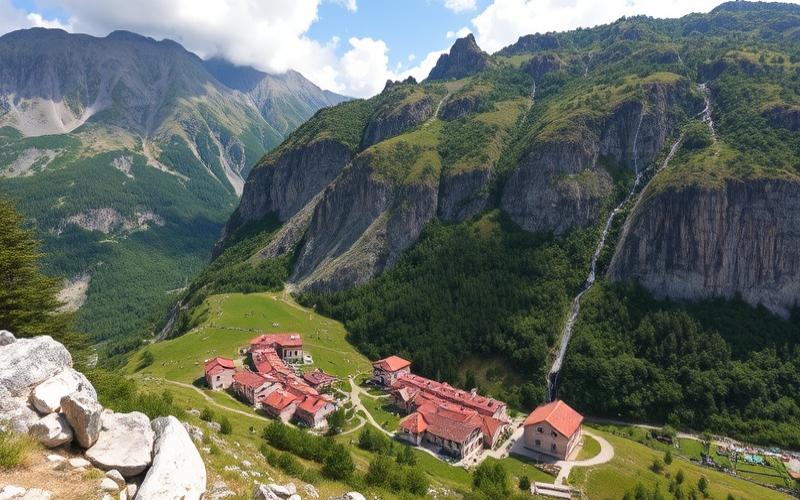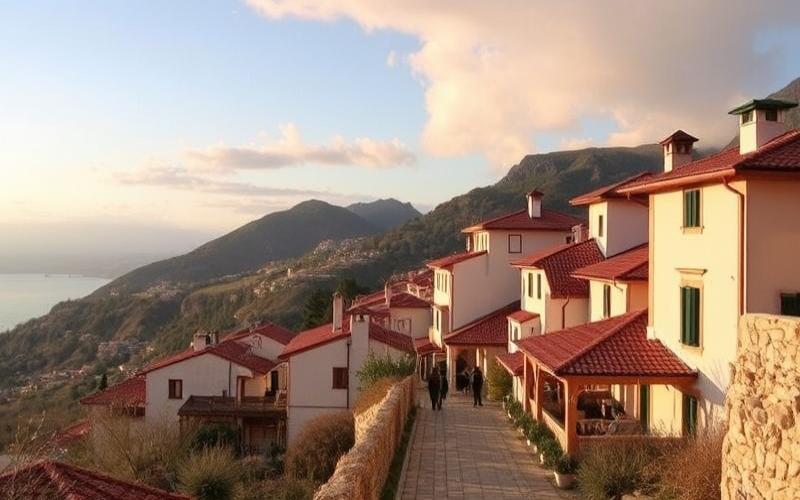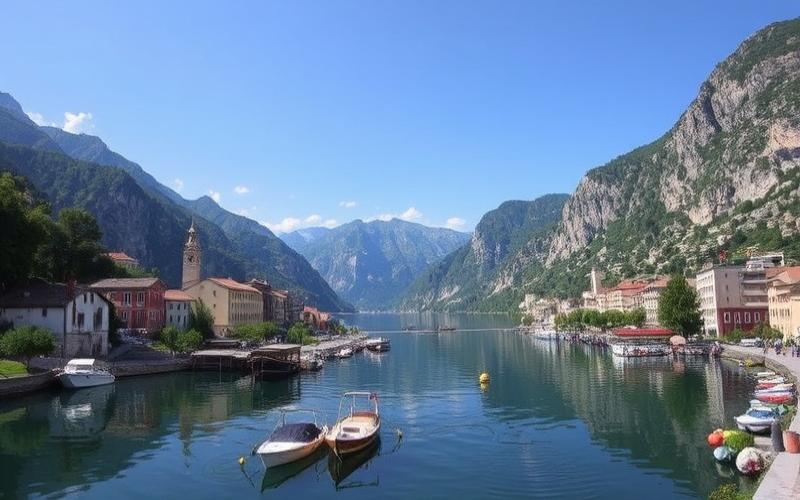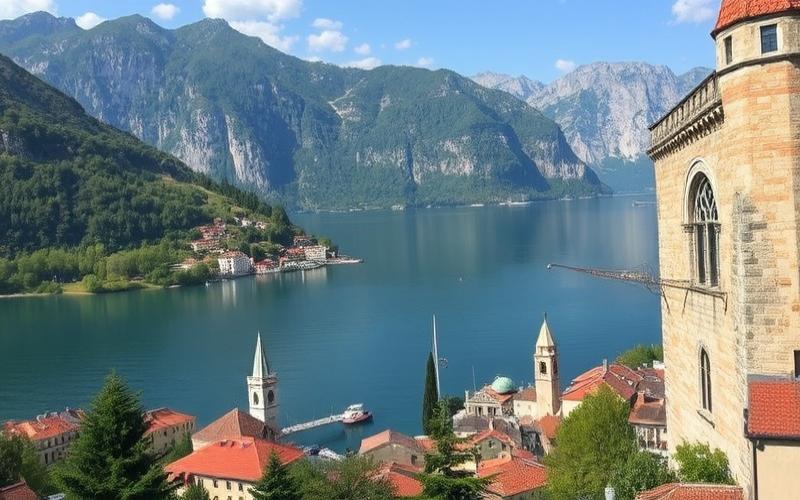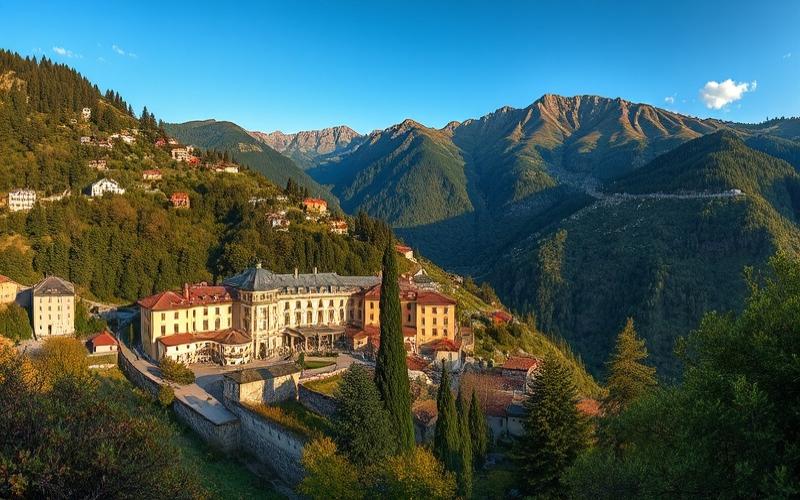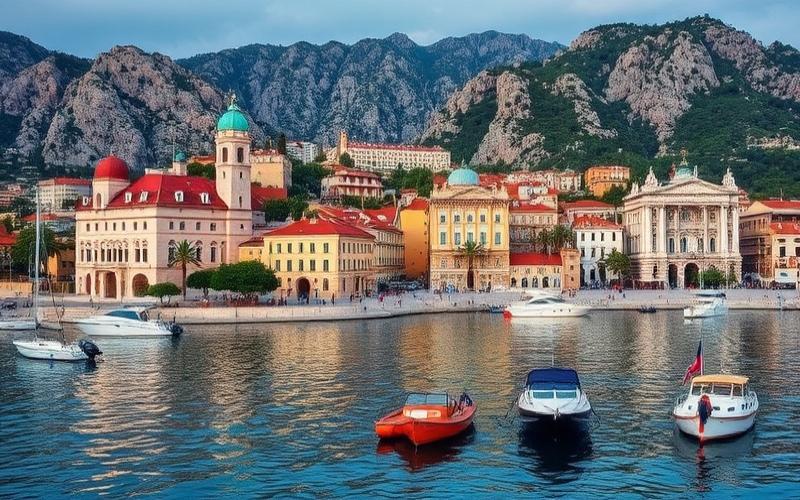
 Published on and written by Cyril Jarnias
Published on and written by Cyril Jarnias
Real Estate Inheritance in Montenegro
Montenegro, a country nestled between the Balkan mountains and the Adriatic Sea, offers a set of unique procedures that deserve special attention. Whether you’re an heir to landed property or simply a curious investor, understanding the property transfer process is essential to avoid legal pitfalls.
This comprehensive guide provides an in-depth dive into administrative procedures, local regulations, and cultural subtleties surrounding property transmission in this enchanting setting. Enjoy a detailed exploration of inheritance rights, legal requirements, and practical advice to navigate smoothly through the Montenegrin system, blending tradition and modernity.
Good to Know:
Montenegro combines European and local legal influences, which can make inheritance procedures more complex for foreigners. Consulting a local expert is recommended to facilitate the process.
The Legal Framework of Real Estate Inheritance in Montenegro
The Montenegrin Civil Code strictly governs real estate inheritance, distinguishing between modes of property acquisition. For properties acquired through inheritance, family division, or court decision, court approval is not required; it only applies to acquisitions by contract (sale, exchange). However, all real estate acquisitions must be documented in writing.
Specific Provisions of the Civil Code Regarding Inheritance
Real estate property transferred through inheritance becomes effective without court approval.
Inheritance rules determine the order of heirs and their respective shares depending on whether a will exists.
In case of death without a will (intestate succession), the law provides a clear hierarchy of rightful claimants:
- First category: direct descendants (children)
- Second category: ascendants and close collateral relatives
- Third category: paternal/maternal uncles and aunts
- Beyond that, any relative or in-law with proven connection may inherit; otherwise, the State receives the estate.
Current Laws and Regulations on Real Estate Inheritance
Recent laws maintain the principle of equality between local citizens and foreigners regarding inheritance rights for properties located in Montenegro.
Recent amendments have strengthened legal security for heirs residing abroad and for those benefiting from foreign wills recognized under certain conditions.
Role of Notaries and Lawyers
The notary drafts or authenticates the will if necessary.
The lawyer provides counsel during the settlement of complex or international inheritances.
| Party | Role in the Inheritance Procedure |
|---|---|
| Notary | Drafting/authentication of the will; verification of deeds; support in division |
| Lawyer | Legal advice; representation in court in case of disputes |
Rights and Obligations of Heirs
Obligation to formally declare their acceptance or renunciation of the inheritance within certain legal deadlines.
Right to an equitable share according to their legal rank or testamentary provisions.
List of Essential Rights:
- Immediate enjoyment of the inherited property if no other formalities are required
- Possibility to sell/transfer the property upon official recognition
List of Main Obligations:
- Potential payment of inheritance taxes
- Respect of the legal deadline to decide on acceptance
Applicable Real Estate Taxes
Real estate inheritances are subject to a specific tax whose amount varies according to:
- The estimated value of the transferred property
- The kinship relationship with the deceased
Indicative example:
| Relationship with Deceased | Approximate Rate |
|---|---|
| Direct descendants | Low |
| Distant collateral relatives | Higher |
Exemptions sometimes exist for surviving spouses living in the concerned dwelling.
International Aspects
Recognition of foreign wills is possible provided they comply with either Montenegrin law or that of the country where they were established. For heirs residing outside Montenegro:
Practical List:
- Mandatory production of translated/certified documents
- Formal proof of hereditary link required by local authorities
In the presence of an international dispute (e.g., multiple nationalities among heirs), it is often the deceased’s last primary residence that determines which law applies.
Recent Practical Examples
- A French national who died owned an apartment in Kotor: his children residing in France were able to inherit directly after presenting to a Montenegrin notary a certified translation of the inheritance certificate issued in France; no additional approval was required as it was an uncontested death transmission.
- In a recent case involving several heirs, some of whom were based outside Europe, the latter had to provide all officially translated documents so their share could be recognized locally before any potential resale—thus highlighting the crucial importance of both procedural and linguistic compliance in this type of international file.
Good to Know:
In Montenegro, the legal framework for real estate inheritance is based on the Montenegrin Civil Code, which provides specific provisions for property transfer. Recent legal amendments highlight the importance of the role of notaries and lawyers to ensure procedural compliance, which includes listing the rights and obligations of heirs and assessing applicable property taxes. Current laws recognize foreign wills and provide a simplified procedure for heirs residing abroad, illustrated by the recent Petrović family case, where European standards of testamentary recognition were applied. Furthermore, direct involvement of a lawyer is often advised to navigate between the nuances of local regulations and potential inheritance taxes to anticipate.
Inheritance Rights for Foreigners in Montenegro
Legal Framework and Regulation
In Montenegro, inheritance is primarily governed by the Montenegrin Civil Code as well as a specific law on inheritance. This legislation covers both the transmission of assets and the rules applicable in cases of inheritance involving foreigners. The principle of equality applies: foreigners enjoy the same inheritance rights as local citizens for real estate property, unless otherwise stipulated in an international treaty or bilateral convention. The 2013 Law on Private International Law specifies the application of the national law of the deceased or the law with manifestly closer ties to them.
Inheritance Taxes
The Montenegrin tax regime regarding inheritance does not distinguish between residents and non-residents nor by their nationality: the applicable tax rate for inheritance transmission is identical for all. There is no progressive scale; generally, a moderate fixed rate (often around 3%) applies to the net value of the transferred property, whether owned by a citizen or a foreigner. Some exemptions may exist for direct line heirs (spouses, children), but they do not depend on nationality.
| Category | Tax Rate | Possible Exemptions |
| Direct heirs | Approximately 3% | Possible exemptions |
| Other heirs | Approximately 3% | Not specified |
| Foreigners | Same as locals | No exclusion based on nationality |
Administrative Procedures
The main administrative steps when declaring an inheritance in Montenegro include:
- Filing a declaration with the competent notary
- Presentation of the following documents:
- Death certificate
- Proof of family relationship (civil status documents)
- Real estate property titles
- Valid identification document(s)
- Respect of legal deadlines to complete this process (usually a few months after death)
- Potential payment of registration fees and tax duties
Sworn translations may be required if some documents are written in a foreign language.
Comparison with Residents
In inheritance matters, there is no notable difference between foreigners and Montenegrin residents regarding:
- The rights to inherit and own real estate
- The applicable inheritance tax rates
- The required administrative procedures
However, some procedures may be more complex for non-residents due in particular to:
- The potential obligation to provide more translated supporting documents,
- Possible enhanced checks during the actual transfer of real estate properties.
| Aspect | Resident | Foreigner |
| Right to inherit | Yes | Yes |
| Tax rate | Same | Same |
| Additional documents | No | Translations sometimes necessary |
Tips and Best Practices
To secure their inheritance procedure in Montenegro, foreigners are advised to:
- Consult a local lawyer specialized in real estate or inheritance law as soon as possible.
- Prepare all their personal and property documents before any procedure.
- Anticipate any required official translation.
- Check if their country has bilateral agreements with Montenegro that might influence tax application.
- Consider possibly structuring through a local real estate civil company (SCI) to facilitate patrimonial transmission.
Practical Cases
Example 1:
A French national dies while owning a villa in Montenegro; his heirs must present a French notarized deed officially translated along with a European Certificate of Succession: they are taxed according to the local scale without discrimination based on their nationality.
Example 2:
A German citizen bequeaths her Montenegrin apartment to her children living outside the EU; they will have to provide certified translated notarial proofs before final registration in the Montenegrin land registry – no specific surtax will be applied compared to nationals.
These examples illustrate both the absence of major tax discrimination against foreigners and the paramount importance given to scrupulous respect of local documentary formalities.
Good to Know:
In Montenegro, inheritance rights for foreigners are governed by the law on inheritance and gift tax, which generally imposes a fixed rate of 3%, applicable regardless of the nationality of the deceased or the heir, although it is necessary to check any specific exemption provided by bilateral treaties. Administrative steps require submitting an inheritance declaration accompanied by documents such as the death certificate and proof of ownership, within legally set deadlines under penalty of fines. Note that compared to residents, foreigners do not benefit from any additional exemption, but it is highly recommended to consult a local specialized lawyer to navigate these complex procedures, minimize costs, and avoid costly delays. A typical example is that of an Italian beneficiary who, without residence in Montenegro, had to make various round trips to complete his file, highlighting the usefulness of local assistance to avoid these constraints.
The Role of the Notary in an International Inheritance in Montenegro
The notary plays a central role in managing international inheritances in Montenegro, especially when heirs reside in different countries and the estate includes real estate properties. Their intervention is essential to guarantee legal security and compliance of the inheritance process with national and international regulations.
Main Competencies and Responsibilities of the Notary in International Inheritance Matters in Montenegro:
- Verification of civil status documents, wills, prior donations, property deeds
- Identification of legal or testamentary heirs according to the law applicable to the inheritance
- Validation of inheritance rights through the establishment of a notarial act of inheritance or Montenegrin equivalent
- Securing the property transfer, particularly for real estate located in Montenegro
Summary Table of the Notary’s Specific Role According to Each Key Stage:
| Stage | Specific Role of the Notary |
|---|---|
| Determination of applicable law | Analyzes international connections (habitual residence, nationality); applies Montenegrin or foreign law depending on context |
| Collection and verification | Checks authenticity of documents provided by foreign heirs |
| Recognition of rights | Officially establishes who the legitimate heirs are |
| Property transfer | Drafts the act enabling secure transfer of real estate ownership to the rightful claimants |
| International collaboration | Communicates with foreign counterparts to collect necessary documents/information |
Facilitation Among International Heirs:
- Centralizes all administrative procedures to avoid geographically dispersed heirs from having to travel;
- Calls upon foreign counterparts if needed to obtain certain official acts;
- Uses knowledge of private international law to ensure effective coordination between different jurisdictions.
Tax Management and Administrative Obligations:
- Ensures all due tax duties are paid in accordance with Montenegrin rules on patrimonial transmission;
- Ensures all mandatory declarations to the local tax administration are made before any effective transfer;
- Advises on potential application of bilateral agreements aimed at avoiding double taxation.
Amicable or Judicial Settlement in Case of Dispute:
The notary can serve as a “neutral intermediary” to encourage an amicable settlement between parties. If necessary, they draft a report precisely designating each party’s rights. In case of persistent conflict, they prepare a solid file that can be submitted to a competent court.
Rigorous Respect of International and Local Regulations:
Thanks to mastery of both the local legal framework and that stemming notably from European Regulation No. 650/2012 (when applicable), the notary guarantees:
- Legal unity (consistent application of a single inheritance law),
- Cross-border recognition of decisions made,
- Formal regularity required by each concerned administration,
- Absence of subsequent challenge regarding executed transfers.
Thus, resorting to a notary during an international inheritance involving Montenegro constitutes an essential guarantee for all rightful claimants: maximum legal security during both division and actual transfers—including those related to real estate properties—while ensuring full compliance with local/international tax laws and all applicable administrative obligations.
Good to Know:
The notary plays a key role in an international inheritance in Montenegro, ensuring liaison between heirs residing in different countries. They handle document verification, validation of heirs’ rights, and securing property transfers, particularly for real estate. According to Montenegrin legislation, the notary ensures that procedures comply with local and international standards, thus helping to harmonize legal discrepancies. They can also serve as an intermediary to resolve potential disputes between parties, thereby ensuring the smooth running of the inheritance process. In terms of compliance, the notary ensures that all tax and administrative obligations are met, thus avoiding subsequent complications for heirs and facilitating cross-border transactions.
Tips for Anticipating the Transfer of Real Estate Property in Montenegro
To anticipate the transfer of real estate property in Montenegro, several legal, fiscal, and practical aspects should be considered to ensure a succession that complies with the owner’s wishes while minimizing the risk of conflicts.
Main Tips for Anticipating Transfer
- Establish a written will according to forms provided by Montenegrin law to clearly designate heirs and distribute real estate patrimony.
- Consider other estate planning tools such as donations or joint ownership, but keep in mind that a will generally offers more flexibility and allows avoiding strict application of legal rules in case of intestate succession (without a will).
- Systematically consult a lawyer specialized in Montenegrin real estate and inheritance law to ensure total compliance with local laws. This professional can also advise on applicable taxation and the best strategy to protect both the owner’s and heirs’ interests.
- Clearly inform all concerned members of your succession intentions to limit the risk of future contestation or family disputes.
Local Law on Real Estate Inheritance
In Montenegro, during inheritance (outside contract), court approval is not necessary to legally become the owner of the inherited property. Transmission occurs automatically by operation of law upon the owner’s death, subject to administrative formalities specific to the land registry. Conversely, any transfer made by contract (sale) requires court approval.
In case of absence of a will:
- Properties are transmitted according to the legal order of heirs.
- Unmarried couples do not automatically benefit from inheritance rights; it is therefore crucial in this particular context to anticipate via a notarial act or a will.
Tax Implications
| Type | Applicable Rate |
|---|---|
| Property tax | 0.1% to 1%/year depending on location/use |
| Transfer duties | Properties €150k–€500k: €4,500 +5% >€500k: €22,000 +6% |
Transfer duties mainly apply during onerous transmissions (sales) but may also concern certain exceptional inheritance situations.
Advantages of Will vs Other Tools
| Tool | Main Advantages |
|---|---|
| Will | Freedom in choosing heirs Legal clarity |
| Donation | Possible anticipation Sometimes reduced taxation |
| Joint ownership | Maintains family unity Management difficulties |
The will remains preferred because it allows:
- Precise expression of one’s wishes
- Prevention of any ambiguity
- Acceleration of certain administrative procedures
Practical Tips to Avoid Family Conflicts
- Communicate transparently about the arrangements made
- Possibly associate key members in important decisions
- Favor as much as possible an equitable or justified distribution
Typical Procedure and Timelines
After death:
- Official declaration to competent authorities
- Possible verification of the land registry regarding the civil and legal status of the property
- Automatic transmission without approval if direct succession; otherwise hearing before competent court if disputes or particular complexities
- Final registration in the name(s) of the new rightful claimant(s)
Timelines generally vary between a few weeks (simple successions without disputes or complex joint ownership) to several months if judicial intervention is necessary.
To ensure your wishes are respected and avoid any future difficulty, always call upon a local specialized lawyer.
Good to Know:
In Montenegro, anticipating the transfer of real estate property involves a good understanding of local inheritance laws, which favor direct heirs but leave little leeway to the owner if no will exists. Establishing a will is therefore crucial to ensure that assets are transferred according to the owner’s wishes and can notably avoid potential conflicts between family members. It is advisable to call upon a specialized lawyer to navigate the fiscal and legal implications, such as inheritance taxes or the need to prove property ownership. To prevent any dispute, transparent family discussions, combined with complete and accessible documentation, are essential. Generally, inheritance settlement in Montenegro can take several months, requiring close coordination with notaries and local authorities; it is therefore wise to begin preparations well in advance.
Disclaimer: The information provided on this website is for informational purposes only and does not constitute financial, legal, or professional advice. We encourage you to consult qualified experts before making any investment, real estate, or expatriation decisions. Although we strive to maintain up-to-date and accurate information, we do not guarantee the completeness, accuracy, or timeliness of the proposed content. As investment and expatriation involve risks, we disclaim any liability for potential losses or damages arising from the use of this site. Your use of this site confirms your acceptance of these terms and your understanding of the associated risks.

